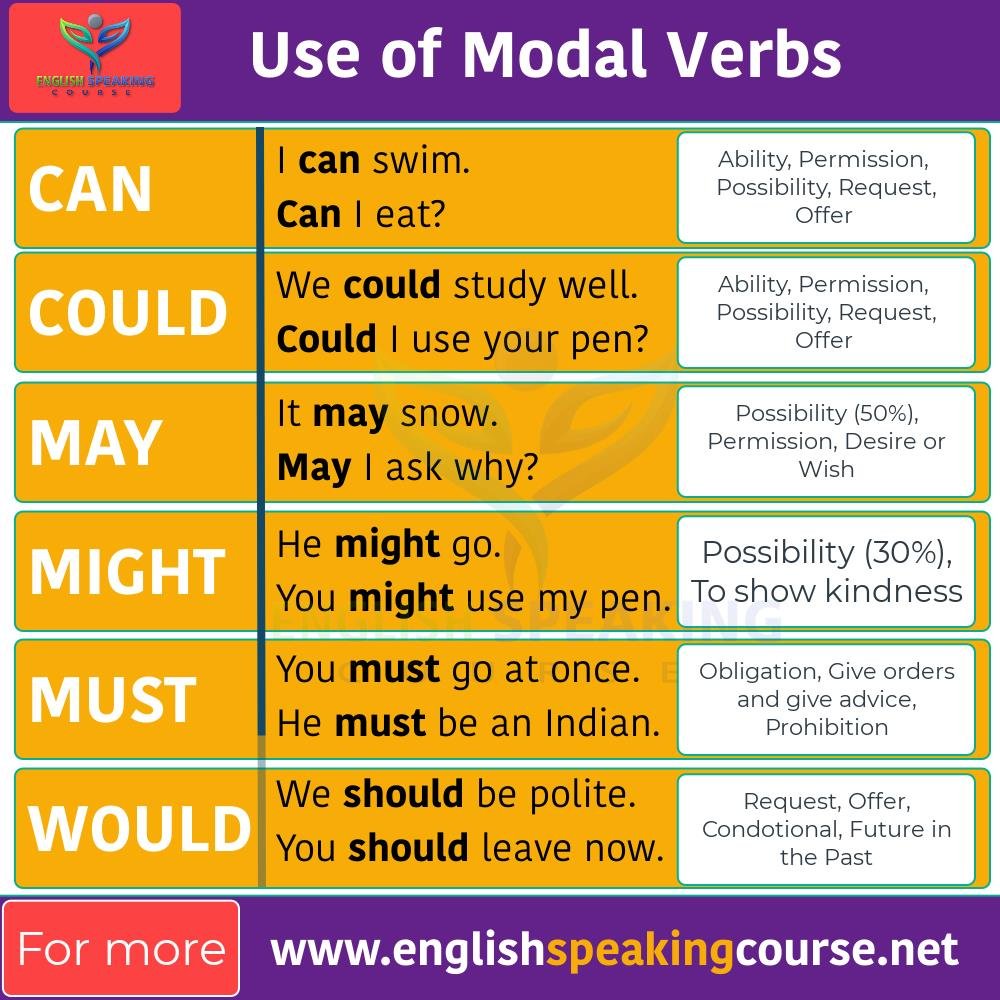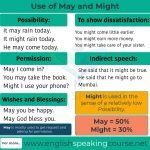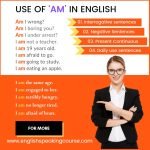
The post is showing Modal verbs – Basic English Grammar but also try to cover the following subject:
–Use of May Might
-Use of Can Could
-Use of Will Would
This is the best place to go when looking for posts about Modal verbs – Basic English Grammar.
Follow our posts regarding Modal verbs – Basic English Grammar and various other comparable subjects on:
Table of Contents
ToggleHow to use Modal Verbs?
If you want to speak English then you must learn about Modal Verb. It is not possible to speak English without them. So of course learn its uses. I will try to teach how to use them as easily as possible.
They are also called Helping Verb because they help the Main Verb. Why are they called Modal Verbs? These Verbs are called ‘Modal Verbs’ because they work according to the Mood of the Subject.
Can
Ability
Can is used to show ability to do something
I can swim.
I can play.
The birds can fly.
I can speak English.
I can speak three languages.
Permission
We use can to ask for permission to do something:
Can you help me?
Can I go to theater?
Possibility
Alcohol can cause cancer.
We can’t live without water.
Request (Informal)
Can I eat?
Can I come?
Can you give me the pencil?
Can I use your laptop, please?
Offer
If you want, I can carry some books for you.
COULD
Past ability
– Could is used to express Past ability
We could study well.
He could speak English.
He could go to theatre.
He could do the work.
He could speak English when he was 5 years old.
He could play cricket well when he was a kid.
Probability (40%)
It could get much hotter in July.
A lot of crime could be prevented.
Polite Request
Could is more formal and polite than can:
Could I please use your mobile?
Could I use your pencil?
Could you tell me the way?
I could lend you my mobile.
Could you tell me please where the bank is?
SUGGESTION
We use could to make suggestions:
We could meet at the month end.
You could eat out tonight.
If you want, we could go out for dinner after office.
MAY
Possibility (50%)
May is used to express possibility.
He may go. – Here The chance is 50%.
It may snow.
You may sit.
You may stay.
You may speak.
That may work.
She may come.
It may rain tomorrow.
Permission
May is also used to express permission.
May I go?
May I eat?
May I begin?
May I smoke?
May I ask why?
May I go home?
May I eat this?
May I help you?
May I come in?
Desire or Wish
May is also used in the sense of desire or Wish
May you live long.
May God help you.
You may be happy.
MIGHT
Indirect speech
Might is the past tense of may in indirect speech. For example:
John said that he might come.
Possibility (30% or less than 30%)
Might shows less possibility than may.
She might come.
He might go.
You might win.
He might get sick.
It might rain today.
I might go to office.
To show kindness:
You might use my phone.
You might use my pen.
MUST
Must is used to express obligation, give orders and give advice.
You must go at once.
He must be an Indian.
You must go to sleep now.
I must help her at any cost.
Prohibition
You mustn’t speak loudly. It is hospital.
SHOULD
The modal verb should is used in the following ways:
To give Advice
You should work hard.
You should leave now.
He should wake up early.
We should be polite.
We should obey the law.
You shouldn’t smoke. It is unhealthy.
Request
Should I wait?
Should I make a phone call, please?
WILL
Prediction
We use WILL to make Prediction:
I think he will study harder this time.
Spontaneous decision
We also use WILL to make Spontaneous decision:
Oh, it’s very hot today. I’II open the window.
WOULD
We can use would as a more formal or polite Request.
Request:
Would you like to buy this?
Would you like coffee or tea?
Would you like something to eat?
Would you hand me the pencil?
OFFER
I would help you with Hindi.
CONDITIONAL
If I had a car, I would drive around the world.
FUTURE IN THE PAST
He said that he would be helping them to move next month.
I hope I have explained to you the correct use of Modal Verb. Now you can use Modal Verb very easily everywhere. These you need to practice and use in your regular life. Only then will you be able to remember them properly.



